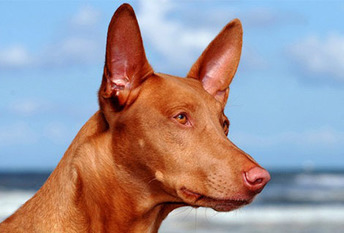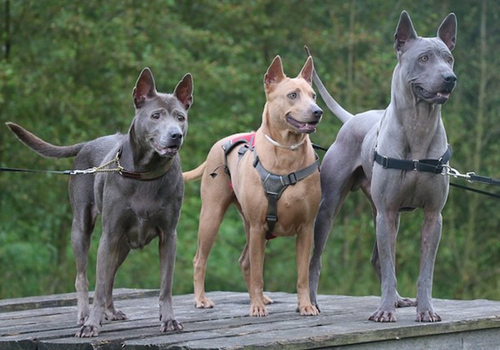The Thai Ridgeback has a short coat that is easily cared for with a weekly brushing. Use a rubber curry brush to keep it gleaming. He sheds year-round, but not heavily. Give him a bath when he is dirty, maybe once or twice a year. The rest is basic care. Trim the nails as needed, usually every week or two. Keep the ears clean and dry, and check them weekly for redness or a bad odor that could indicate infection.
If the ears look dirty, wipe them out with a cotton ball moistened with a mild pH-balanced cleanser recommended by your veterinarian. Brush the teeth regularly with a vet-approved pet toothpaste for good overall health and fresh breath. Introduce your puppy to grooming from an early age so that he learns to accept it with little fuss.
Thai Ridgebacks were bred to work and they require a lot of exercises. Long walks or jogs are great but this breed also needs room to stretch out and run. He can tolerate living in condos or apartment buildings provided there is a dog park nearby that he can use.
Without enough exercise, Thai Ridgeback can become incredibly destructive and disruptive. Although not a barker, the dog will become frustrated and try to communicate his need for activity vocally. He will also tear up furniture and chew whatever he can get his teeth on if he is bored. Exercise is essential to living peacefully with this breed.
An athletic and high-energy dog, the Thai Ridgeback needs to be fed a high-quality diet of dry kibble. The food should be formulated for the particular dog’s activity level. Dry food is essential to this breed’s oral health as wet foods can cause caries, gum infections and bad breath.
Any diet should be appropriate to the dog’s age (puppy, adult, or senior). Some dogs are prone to gettingoverweight, so watch your dog’s calorie consumption and weight level.Treatscan be an important aid in training, but giving too many can cause obesity.
Learn about whichhuman foodsare safe for dogs, and which are not. Check with your vet if you have any concerns about your dog’s weight or diet.Clean, fresh water should be available at all times.
Thai Ridgebacks are pretty healthy dogs. The breed is seeing incidences ofhip dysplasia whichmay or may not be environmentally caused. Thai Ridgebacks are also predisposed to having dermoid sinus.
An independent breed, the Thai Ridgeback requires an experienced owner who can assert himself to be the leader of the family. Manhandling and harsh discipline is counter-productive to training this breed. The Thai Ridgeback responds well to positive training methods and learns rather quickly when delectable treats are involved. Repetitive training sessions will prove to be worth the time.
One of the things that the Thai Ridgeback was bred to do was to pull carts in Thailand. Nowadays, he is well-suited for draft trials, obedience and agility. Naturally protective and reserved with strangers, Thai Ridgebacks would do best with proper socialization and training. Of course, this breed can be an incredible watchdog.











